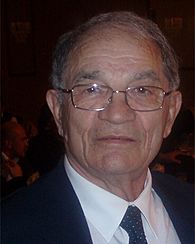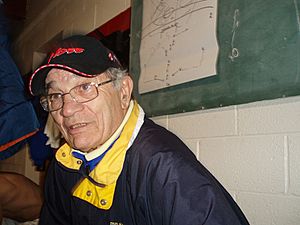Dragoslav Šekularac facts for kids

Šekularac in November 2007
|
||||||||||||||||||||||
| Personal information | ||||||||||||||||||||||
|---|---|---|---|---|---|---|---|---|---|---|---|---|---|---|---|---|---|---|---|---|---|---|
| Full name | Dragoslav Šekularac | |||||||||||||||||||||
| Date of birth | 8 November 1937 | |||||||||||||||||||||
| Place of birth | Štip, Kingdom of Yugoslavia | |||||||||||||||||||||
| Date of death | 5 January 2019 (aged 81) | |||||||||||||||||||||
| Place of death | Belgrade, Serbia | |||||||||||||||||||||
| Height | 1.71 m (5 ft 7 in) | |||||||||||||||||||||
| Position(s) | Attacking midfielder | |||||||||||||||||||||
| Youth career | ||||||||||||||||||||||
| 1951–1955 | Red Star Belgrade | |||||||||||||||||||||
| Senior career* | ||||||||||||||||||||||
| Years | Team | Apps | (Gls) | |||||||||||||||||||
| 1955–1966 | Red Star Belgrade | 375 | (119) | |||||||||||||||||||
| 1966–1967 | Karlsruher SC | 17 | (2) | |||||||||||||||||||
| 1967 | St. Louis Stars | 8 | (1) | |||||||||||||||||||
| 1968 | OFK Belgrade | 38 | (5) | |||||||||||||||||||
| 1969–1971 | Santa Fe | 42 | (3) | |||||||||||||||||||
| 1972 | Atlético Bucaramanga | 4 | (1) | |||||||||||||||||||
| 1973 | Millonarios | 23 | (1) | |||||||||||||||||||
| 1974 | América de Cali | 7 | (0) | |||||||||||||||||||
| 1975 | Paris | 9 | (2) | |||||||||||||||||||
| 1975 | Serbian White Eagles | |||||||||||||||||||||
| International career | ||||||||||||||||||||||
| 1954–1956 | Yugoslavia U20 | 8 | (2) | |||||||||||||||||||
| 1955–1956 | Yugoslavia U21 | 2 | (0) | |||||||||||||||||||
| 1956–1966 | Yugoslavia | 41 | (6) | |||||||||||||||||||
| Managerial career | ||||||||||||||||||||||
| 1975 | Serbian White Eagles (player-coach) | |||||||||||||||||||||
| 1978 | New York Eagles | |||||||||||||||||||||
| 1984–1985 | Guatemala | |||||||||||||||||||||
| 1986–1987 | Footscray JUST | |||||||||||||||||||||
| 1989–1990 | Red Star Belgrade | |||||||||||||||||||||
| 1990–1991 | América | |||||||||||||||||||||
| 1992 | Al Nassr Riyadh | |||||||||||||||||||||
| 1993 | Heidelberg United | |||||||||||||||||||||
| 1994–1995 | Marbella | |||||||||||||||||||||
| 1996 | Busan Daewoo Royals | |||||||||||||||||||||
| 1997 | Napredak Kruševac | |||||||||||||||||||||
| 1999 | Obilić | |||||||||||||||||||||
| 2006 | Serbian White Eagles | |||||||||||||||||||||
|
Medal record
|
||||||||||||||||||||||
| *Club domestic league appearances and goals | ||||||||||||||||||||||
Dragoslav Šekularac (born November 8, 1937 – died January 5, 2019) was a famous Serbian football player and coach. He was often called Šeki by his fans.
Šekularac was known for being very fast and clever with the ball. He had amazing skills that made many people watch him play. He was confident and technically brilliant, making him one of the biggest stars in Yugoslav football history. His popularity in Yugoslavia in the early 1960s was huge. He became one of the most recognized people in the country. After his playing career, he coached many clubs in different countries. He also coached the Guatemala national team.
Šekularac is seen as one of the most important players for Red Star Belgrade. He is one of only five players to receive the special Zvezdina zvezda status. This means "Star of Red Star".
Contents
Early Life and Football Start
Dragoslav Šekularac was born on November 8, 1937, in Štip, which was part of Yugoslavia at the time. His father was from Montenegro and his mother was from Macedonia. His family moved to Belgrade when he was a baby. His father worked for the Ministry of Agriculture.
Šekularac was born with legs that curved outwards, like another famous footballer, Garrincha. He started playing football very early, right after World War II. He joined the youth team of Red Star Belgrade.
Club Career Highlights
Šekularac played his first senior game for Red Star Belgrade when he was just 17. This was on March 6, 1955. He quickly became a key player for the team.
In the 1955–56 season, he helped Red Star win the Yugoslav league title. He scored 7 goals and showed off his amazing midfield skills. The next season, 1956–57, he helped Red Star win another league title. He also played a big part in their journey to the semi-finals of the European Champions' Cup.
In 1959, after winning both the league and cup with Red Star, a rich Italian businessman from Juventus wanted to sign him. However, the government in Yugoslavia did not allow the transfer. They said Šeki was needed in the country to "entertain the working class."
In 1962, during a league match, Šekularac had an incident with a referee. This led to him being suspended from playing for a year and a half. He played a total of 375 official matches for Red Star, scoring over 119 goals.
Later, he played for Independiente Santa Fe in Colombia for five seasons. Fans there called him el Pelé blanco, meaning "the white Pelé". He also played for other clubs like Millonarios and Paris FC. He finished his playing career in Canada as a player-coach for the Serbian White Eagles in 1975.
International Football Journey
Šekularac made his debut for the national team on September 30, 1956, when he was only 18. He was part of the Yugoslavia team that won a silver medal at the 1956 Summer Olympics in Melbourne, Australia.
He also played in the World Cups in 1958 and 1962. Overall, he played 41 games for his country and scored 6 goals. A special moment in his international career was the 1960 European Nations' Cup. He was chosen as one of the best players in the tournament.
His Unique Playing Style
Šekularac was known for his speed and cleverness with the ball. He had creative skills that amazed everyone. He was very confident and had excellent technical ability. This made him one of the most exciting players to watch in Yugoslav football. His huge popularity in Yugoslavia in the early 1960s went beyond just sports. He was one of the most famous people in the country.
While many praised his skills, some also felt he didn't always play enough as a team player. Others thought his amazing talent didn't always show up in his overall statistics.
Coaching Career Highlights
Serbian White Eagles FC Coaching
In February 2006, Šekularac became the head coach for the Serbian White Eagles team in Canada. He had played and coached for them before. He brought in experienced players from Serbia and Europe.
His time as coach, though short, was very successful. The team did great in their first season. They finished first in their conference with 55 points. They won 17 games, lost only 1, and tied 4 times. They scored 66 goals and only let in 13.
The Eagles reached the play-offs and easily won their quarter-final and semi-final matches. They almost won the championship but lost 1–0 in the final game.
Personal Life
Šekularac had a son named Marko and three daughters named Aleksandra, Ivana, and Katja. His younger brother, Mirko, was also a footballer. Mirko's grandson, Kristian, is also a professional footballer today.
Besides Serbian, Šekularac could speak English, Spanish, and some Portuguese. He also loved playing chess. Just weeks before he passed away, he played a game against the famous chess champion Anatoly Karpov and managed to draw.
Death and Lasting Impact
Dragoslav Šekularac passed away on January 5, 2019, in Belgrade, Serbia. He is buried in the Alley of Distinguished Citizens in Belgrade.
To honor him, the Serbian White Eagles Academy was named after him.
Honours
Player
- Red Star Belgrade
- Yugoslav First League: 1955–56, 1956–57, 1958–59, 1959–60, 1963–64
- Yugoslav Cup: 1957–58, 1958–59, 1963–64
Independiente Santa Fe
- Categoría Primera A: 1971
- Copa Simón Bolívar: 1970
- Yugoslavia
- Summer Olympics Silver medal: 1956
- UEFA European Championship runner-up: 1960
- Individual
- UEFA European Championship Team of the Tournament: 1960
Manager
- Red Star Belgrade
- Yugoslav First League: 1989–90
- Yugoslav Cup: 1989–90
- Heidelberg United
- NSL Cup: 1992–93
- Serbian White Eagles
- Canadian Soccer League (International Division): 2006
- Canadian Soccer League: 2006 (Play-offs) (runner-up)
See also
 In Spanish: Dragoslav Šekularac para niños
In Spanish: Dragoslav Šekularac para niños
 | Sharif Bey |
 | Hale Woodruff |
 | Richmond Barthé |
 | Purvis Young |


